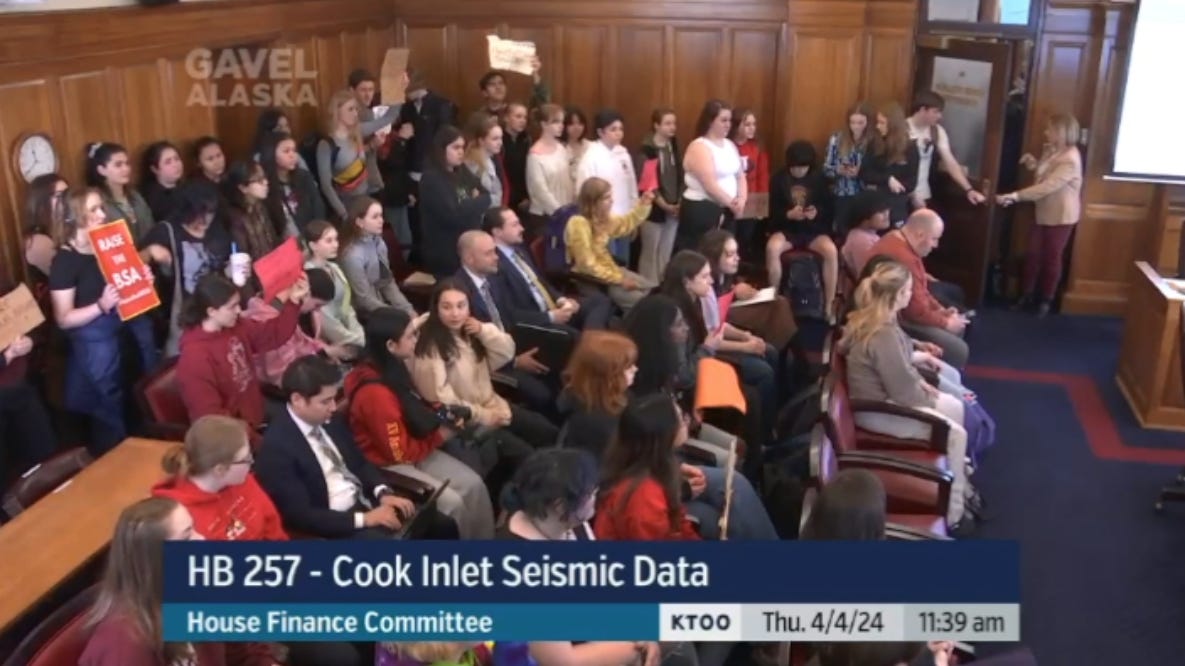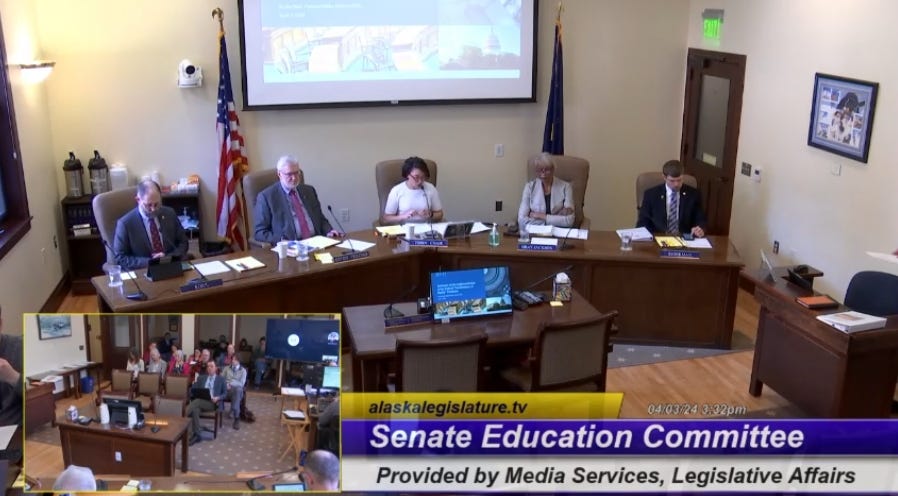Happy Friday, Alaska!
In this edition: It’s been quite the week. The budget is coming together in the Legislature, Anchorage had a big election setting up another mayoral run-off election and the latest battle in the war over Alaska’s voting system was filed in court. That’ll all have to wait for another edition, though, because we need to talk about the walkout students held this week to demand meaningful action on public school funding. While the Republicans who helped kill the landmark education bill insist that a second deal is right around the corner, hope is fading quickly. Meanwhile, legislators still have more questions than answers regarding the state’s apparent bungling of federal school funding—also, the reading list and a weekend watching to fit Wrestlemania weekend.
Current mood: 🤼
40 minutes
Students from throughout Alaska walked out of class on Thursday for 40 minutes to represent the 40-vote threshold legislators fell a single vote short of when they failed to override the governor’s veto of the education bill last month. Much to the chagrin of right-wingers who seem to believe that kids have no right to advocate for themselves, students in Juneau crowded the hallways of the Alaska Capitol Building with chants of “Raise the BSA” and “Fund our Future.” Many filled the audience of a House Finance Committee meeting, waiting until it was over to talk face-to-face with some of the legislators whose decision to flip-flop on the bill sealed its fate.
“What I see with the BSA increase is not the adding of new things; it’s the hanging-on-by-a-thread to things we do have,” Felix Myers, the Sitka High School senior who helped organize the walkout as part of the Alaska Association of Student Government Executive Board, told the Anchorage Daily News. “We’re tired of feeling like our voices don’t matter, and we feel the need to show up and send a message that we do care about our education, we do care about our future of education for students that come after us, and we believe in a better future. … It shows that we are engaged and we believe we deserve better. And I do hope that with that show of force that no one can deny our right to an adequate education, which is our constitutional obligation.”
All of it, however, comes against a backdrop of incredible uncertainty around school funding and education policy in Alaska. Gov. Mike Dunleavy and his allies have tried to save face after blowing up the hard-fought education bill, insisting that a second education bill is right around the corner and that despite their votes, they support a permanent increase to education funding.
“There’s hope, guys. There’s hope,” Anchorage Republican Rep. Julie Coulombe, one of the 17 Republicans who voted against the bill, told the students after the House Finance Committee meeting.
But that hope is fast fading.
While they may talk about supporting some kind of permanent increase in education funding, Dunleavy and his Republicans demand it be tied to their vague notion of education reforms. In a prepared statement, the governor’s office reiterated this demand, writing that the governor “has said numerous times he supports a BSA increase, but that money alone will not improve Alaska’s educational outcomes. Our public schools need educational reform legislation.”
The problem, of course, is that he’s not talking about a broad swath of well-reasoned education policy reforms to improve the educational outcomes and opportunities throughout the state but his beloved charter school expansion. The only “reform” he’s requested is the power to reach into local school districts and force them to run whatever charter school can get the blessing of his far-right Board of Education.
The Senate has already said the idea — which would tread on the foundational concept of local control by bypassing the locally elected school board to force them to run state-sanctioned charters — is a non-starter, and no one has answered how the governor and his allies plan to thread an impossible needle.
That’s also not to mention that the House Republicans’ Education Bill 2.0, House Bill 392, was completely absent from this week’s House Education Committee. There’s apparently a whole new version in the works, but it looks like they’re going to be rolling right into taking public testimony on the bill, with it scheduled bright and early at 8 a.m. on Monday and Wednesday next week.
More coverage: The Alaska Current/Anchorage Daily News/Alaska Public Media/KTUU/KTOO/KYUK/Peninsula Clarion/Fairbanks Daily News-Miner
Legislators get few answers on U.S. Department of Education funding snafu
It’s been more than a week since Alaska got the news it had been labeled a “high-risk grantee” by the U.S. Department of Education, and legislators really don’t have any answers about what got us into this position and what the next steps will be.
The Senate Education Committee held an emergency hearing on the issue this Wednesday, but officials with the Alaska Department of Education skipped the meeting with the justification that they’re working on an appeal. Instead, the committee met with Austin Reid, the National Conference of State Legislature’s expert on federal education funding, who stressed he doesn’t have any unique insight into Alaska’s situation but has been following the issue with other states.
Basically, the issue is that the federal pandemic relief policy came with the condition that states equitably maintain their funding to schools with high concentrations of students from lower-income families. He said it was a “new and novel policy” brought about by concern that states would use the pandemic and the influx of federal dollars to cut school funding. He said that that was not the case, as most states increased funding during the pandemic, but it still created other problems.
The main issue, as he explained, is that the feds measure equity solely by looking at the economic background of students, whereas state school funding formulas take into account a load of other factors, such as the needs of the students and the cost of living in their community. He said the two don’t always neatly align, and that can create problems like the ones Alaska is now facing.
That’s why Department of Education Commissioner Deena Bishop has claimed that Alaska has done nothing wrong and is telling districts not to count on the $29 million being paid back anytime soon. The state didn’t deviate from its funding formula, she argues, so it couldn’t have violated the law.
But as Reid said, it’s more complicated than that, and federal law doesn’t have much flexibility. He noted that other states have already paid back a combined $267 million to comply with the maintenance of equity provisions. What flexibility the U.S. Department of Education has, he said, been granted to many states. He said, though, that letters like the one the state received last week, demanding the state come up with a plan to repay $29 million to four school districts, usually come after those negotiations have been exhausted.
“I would guess that’s why these final numbers have been provided and why they’re asking for these supplemental appropriations,” he said, explaining the two areas where the feds have offered states flexibility. “That’s been the dynamic in other states. When those two options that I’m aware of are exhausted, it’s when we move into the department asking for supplemental appropriations.”
Commissioner Bishop has already indicated they plan to continue to fight the issue.
What direction things might head in is unclear, but legislators explored some potential solutions at the meeting.
In basic terms, legislators have three options:
Wait for the governor to request the $29 million
Put the $29 million into the budget unilaterally
Hope that the governor’s appeal to the feds works out
Senate Education Committee chair Sen. Löki Tobin said there was another option, noting that some other states have responded by simply passing a blanket increase in education funding to all schools.
“There are many options that are on the table for us to come into compliance,” she said. “It is not simply giving certain school districts resources. We could give every school district resources if we chose to do so.”
The Senate Education Committee has scheduled a second hearing next Friday on the issue, which Sen. Tobin said she hopes the state will participate in.
Reading list
Mayor Bronson is first incumbent mayor in 30 years to be forced into a run-off election
Murkowski insists ‘I’m in the right place,’ despite rift with Trump
Anchorage officials aim to keep camping in check as winter shelters wind down
My bylines with The Alaska Current
Division of Elections gave anti-RCV initiative special treatment, lawsuit alleges
Legislators try but get few answers on federal school funding problem
State funding for year-round shelter in Anchorage falls a vote short (they ultimately reversed themselves)
Weekend watching
It’s Wrestlemania weekend, bay-bee. There are loads of excellent wrestling explainer videos out there, but here’s an extra-deep dive into the biggest storyline in many years of professional wrestling: The story of Roman Reigns. And, fun fact: the first show I tuned back into on a rainy Juneau afternoon with a Breeze-Inn burrito, rekindling my childhood obsession with WWE, is the first one mentioned in this video.
Have a great weekend, y’all.





